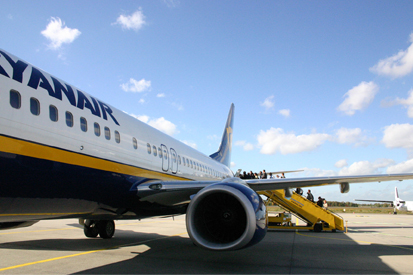
Ryanair chief executive Michael O'Leary is rarely out of the headlines with his stream of novel ideas to aid cost-cutting and fuel revenues.
There have been suggestions of standing-only flights, charging for the use of the lavatory and, perhaps most worryingly, axing co-pilots and training stewardesses in their place.
Never afraid of courting controversy, he has labelled global warming 'horseshit' and the Intergovernmental Panel on Climate Change 'utter tosh'.
However, having tested the no-frills concept almost to the point of destruction, O'Leary appears to have undergone a Damascene conversion. In an interview with The Observer last week, he announced a desire to move his company away from the 'pile it high, sell it cheap' ethos, to a more sophisticated brand strategy.
Ryanair has become the biggest short-haul carrier in Europe, with 250 aircraft. It is one of the few airlines to enjoy continual growth of passenger numbers and has already carried 73.5m people this year.
Quality of service
However, it is exactly this growth that puts pressure on the company's current no-frills, low-cost approach. Suddenly it looks like the business model the airline is built on might not be sustainable.
'What we offer is a service that is unrivalled. We have the best punctuality, the fewest lost bags and the best completion rate,' says Stephen McNamara, head of communications at Ryanair. 'We'll always be obsessed with having the lowest fares in the market, but in the future we'll change from a low-fares to a quality-of-service message.'
Yet, he insists that this does not signal the end of the low-cost carrier service. 'The frills that matter most to people are those that cause the most frustration if they don't happen correctly,' he adds, pointing out that over the next five to six years, the airline wants to start promoting its ability to stick to schedules, turn aircraft around quickly at airports and make sure that bags are returned to the passenger at their destination.
However, in shifting its focus from low fares to quality of service, Ryanair may risk missing an opportunity to introduce further on-board changes that could culminate in a more far-reaching repositioning.
'The one thing that Ryanair has been really good about, is that you get exactly what it says you are going to get,' says Manfred Abrahams, brand strategy director at consultancy Interbrand. Nonetheless, he believes the airline could improve its service without having to hike prices, citing US companies Jet Blue Airways and Southwest Airlines as notable examples of low-cost carriers that do not compromise on the passenger experience.
'Southwest Airlines pride itself on its service, and Jet Blue has installed in-flight TV - the cost isn't that much more but at least you're being entertained,' he adds. 'You get what you expect, but it's nice. On Ryanair, you feel the opposite of that.'
Regardless of whether in-flight service is an area in which the Irish carrier is considering taking action, experts believe that Ryanair understands its existing strengths.
'O'Leary is not being stupid; he recognises that it has a certain product,' says James Halstead, senior associate at consultancy Aviation Economics. 'The brand is seen as low-cost, not one that gets you there on time with your bag.'
Halstead adds that Ryanair is 'getting to the point where it's a big enough size (to) continue to operate on a low-cost base, but start attracting people from a different point of view'.
Ultimately, though, if the airline is serious about attracting customers to whom quality of service is important, Ryanair may have to undergo some more significant brand realignment. In that case, O'Leary himself might do well to start keeping his own counsel, or at least think more carefully before he speaks.

